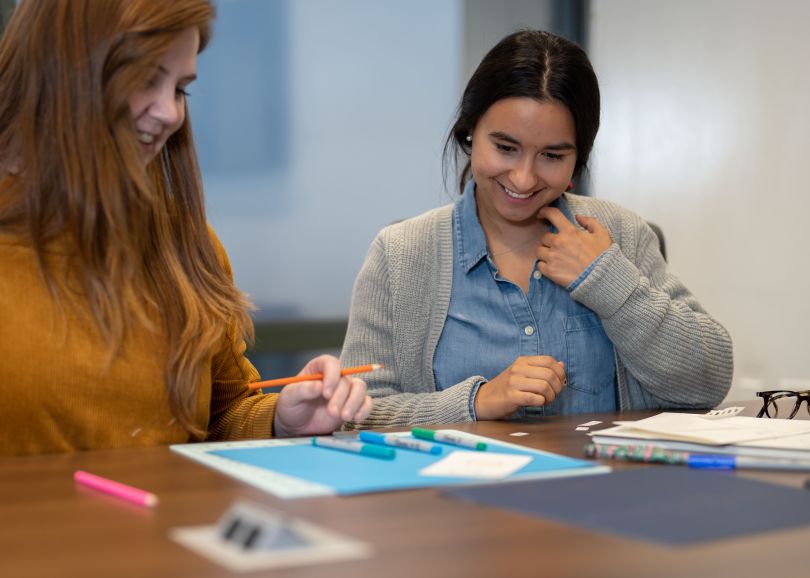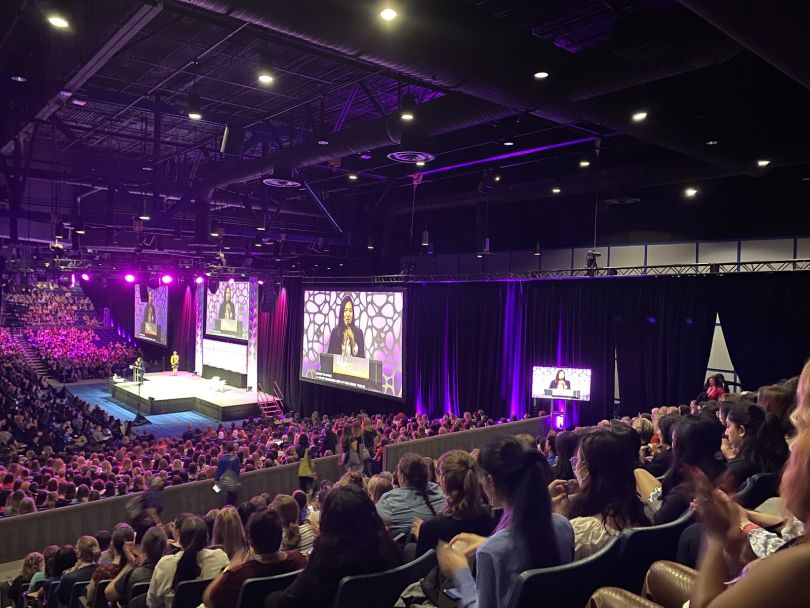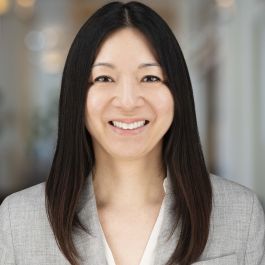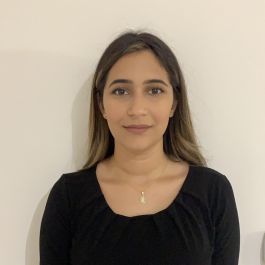“As leaders, by being vulnerable we give everybody else permission to be vulnerable — and be their most authentic selves.”
Those words, spoken by Motorola Solutions’ Sharon Hong, were the underlying theme of a recent discussion with Rasheedah Edwards and Armaghan Mehrsa about being a woman engineer at the company. Hong, Motorola Solutions’ VP of safety reimagined ecosystem solutions, explained that she learned this lesson through a women’s leadership program the company gave her the opportunity to attend.
“What this class taught me was how important it was to be visible to other women. It’s that whole premise of: If you can see it, you can be it,” said Hong. “That’s when I realized how important it was to get and give that exposure to others.”
That realization motivated her to found the Women of the West, a group of Motorola Solutions’ West Coast employees that eventually became a regional chapter of the company’s Women’s Business Council.
“I learned the importance of making sure we have a network and a place to speak openly and candidly, because regardless of the fact that we do the same job, the personal experience of women in the workplace is different from the majority of our peers,” she said. “There are some things I’ll specifically talk about with my women colleagues because, in those instances, I feel women can relate more to what I’m going through. I don’t have to explain it and that really helps the experience.”
“Regardless of the fact that we do the same job, the personal experience of women in the workplace is different from the majority of our peers.”
Exemplifying this statement, the conversation with Hong, Edwards and Mehrsa revealed that talking to and learning from each other and the community of women at Motorola Solutions encourages them to be their best, authentic selves.
Communities like the WBC and the Society of Women Engineers — within which Motorola Solutions has a robust and active chapter — along with their relationships with mentors and colleagues, remind Hong, Edwards and Mehrsa that being themselves is not only allowed, but encouraged. In fact, it’s the best way to make a unique contribution and inspire others.

Why Motorola Solutions Matters
Hong, Edwards and Mehrsa each came to the company through a very different path, but all have found things about both the work and the culture that make them proud Motorolans.
Hong, who refers to herself facetiously as a “lifer,” did not expect to be at Motorola Solutions for over two decades, but the meaningful, hands-on work she’s been able to do has inspired her to keep growing within the company.
“One of my biggest fears coming out of college was that I wouldn’t find meaning in what I do. I wanted to feel like there was a purpose behind the work that I do,” she said. “Knowing that what we do helps save lives is something I think we all take tremendous pride in.”
Mehrsa, a senior digital design engineer, joined the company six years ago as an intern, then returned after finishing her education. In addition to the satisfaction of keeping people safe, she cited the company’s supportive culture as a main draw.
“It’s such a comfortable environment,” she said. “You’re not scared to ask questions or bring up something. You truly feel at home here — you don’t have to drag yourself into work.”
Edwards is the most recent member of the team, having joined Motorola Solutions as a senior software engineering manager in 2019. Edwards has a wealth of experience in the industry, having worked at IBM for 15 years before moving to Avtec, a company that Motorola Solutions later acquired.
“At IBM, we had these diversity groups where, as a young person coming out of college, I was able to meet other people who saw me for who I was — not just the only woman or black person in the group,” Edwards said. “When I had kids and got my masters, it was that network that really helped me push through challenges.”
“When I had kids and got my masters, it was that [diversity group] network that really helped me push through challenges.”
At her next position, Edwards missed her access to a larger work network like she had at IBM. Motorola Solutions entered her life just in time, as the pandemic reared its head.
“When Covid-19 made us all go remote, the brunt fell on women because kids couldn’t go to school, and that was a lot,” she said. “I remember having a meeting with Sharon where she just laid it out that we weren’t going to have an agenda — she just wanted to know how everyone was doing. That touched my soul — I didn’t realize I was drowning until I was in that meeting hearing, sharing and learning from others. It was such a pivotal meeting.
“That’s what Motorola Solutions means to me,” she continued. “It is helping me be my best self. I have a team of women that is there for me and sees me. Not to mention that our products keep the world safe — even if you personally don’t purchase them, our products are keeping you safe.”

Inspiring Each Other
“There’s complexity around the experience of women in the workplace,” said Hong. “I’ve learned a lot about that complexity through the open environment we have at Motorola Solutions and the WBC.”
With a quick aside to get Edwards’ blessing, Hong brought up a particular moment where Edwards opened her eyes to the diversity of thoughts and experiences within their community.
“We had a conversation about some tools we found online that can tell you if a job description is written with more ‘masculine’ or ‘feminine’ words; a lot of technical positions are written with more masculine words,” Hong recalled. “I sent it out, saying that it was a great tool and that we should all use it — and interestingly, Rasheedah responded and said: ‘I don’t think about these as masculine or feminine things, they’re just things people should be.’
“I’d thought that this would resonate with everyone, but it depends on your leadership style, what you think about as a person and what your role is,” she continued. “I learned a lot from that conversation.”
Rasheedah spoke more about those differing perspectives — along with the fundamental thing they can all learn from each other.
“I’m a Black woman, and I can meet another Black woman and have two completely different experiences,” she said. “What’s important is being vulnerable and sharing your journey — it gives people permission to be who they are. When I started working, I thought I had to meet a certain perception, and it took years of people talking to me — colleagues, diversity groups, friends — to realize that I don’t need to do that. I don’t need to be like you, I just need to be honest about who I am.”
The need to learn from each other’s experiences and be inspired to be their authentic selves is one of the main reasons Hong sponsors Motorola Solutions’ chapter of the Society of Women Engineers. The chapter is highly active, to the point where Hong got to be a speaker at one of SWE’s annual conferences.
The Society of Women Engineers
The Society of Women Engineers is a nonprofit organization that supports women in all levels of engineering, including a strong collegiate presence. The organization hosts a professional development conference every year that covers topics from engineering to diversity to leadership skills and navigating difficult situations. Motorola Solutions’ chapter is active at this conference — it sent more than 300 people last year, and hosted a panel of Motorolans to discuss intersectionality.
Mehrsa’s attendance at last year’s conference left a major impact on her — both in terms of who she met and what she learned.
“That’s where I met Rasheedah and Sharon,” she said. “It was my first time being at a networking event with that many women — and with that many women from our company. I left SWE feeling motivated, inspired and recharged for months on end. I had met so many powerful women leaders and learned so much just by talking to them — even through the personal conversations.”
At that conference, Armaghan learned that crucial, aforementioned lesson: It’s not just allowed, but critical to be yourself.
“I was used to having a different exterior personality because I was around so many men all the time,” Armaghan said. “This is the first time I realized I could shed that and be myself — even dress and speak how I wanted. I started acting more myself in the office after seeing other women — including Sharon and Rasheedah — do that, and seeing where it’s gotten them. It’s so much nicer and easier to be yourself, and you see how receptive people are to it.”
“I was used to having a different exterior personality … I started acting more myself in the office after seeing other women do that, and seeing where it’s gotten them.”
Through their connections and community with other women, Hong, Edwards and Mehrsa have not only been given support and guidance at work, but permission to be vulnerable and be themselves through seeing the vulnerability in others. For Edwards, that value is at Motorola Solutions’ core.
“At Motorola Solutions, we want to create an environment where everybody — engineers, supply chain managers, individual contributors, project managers, VPs — can be their true selves. That’s my goal as a manager: Bring that out of my people, my peer managers, the people that manage me — everyone I come into contact with.”
She added, “You are enough.”








